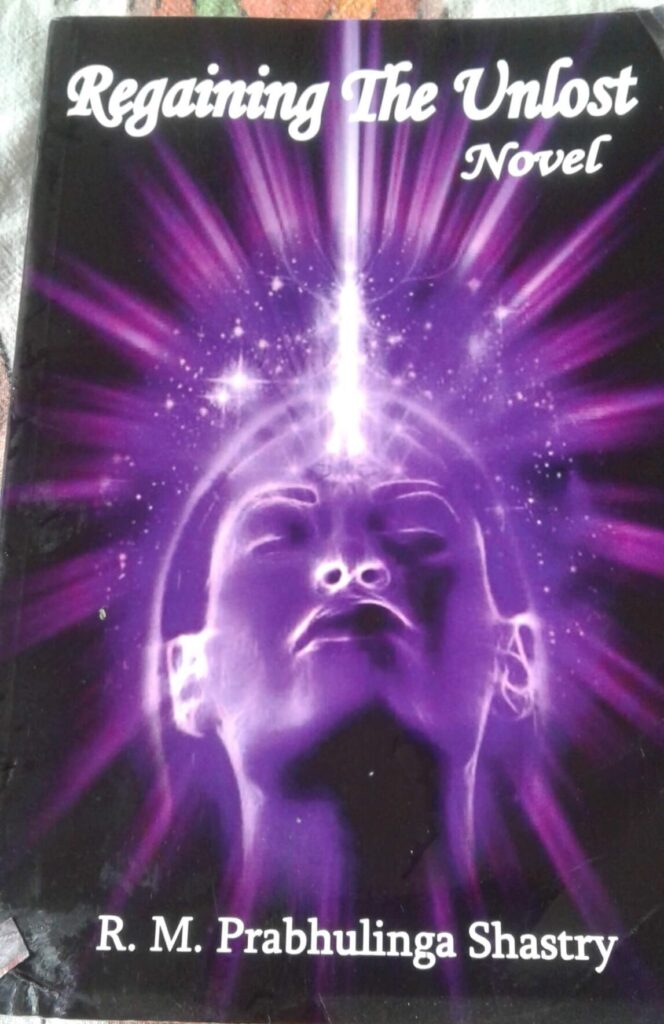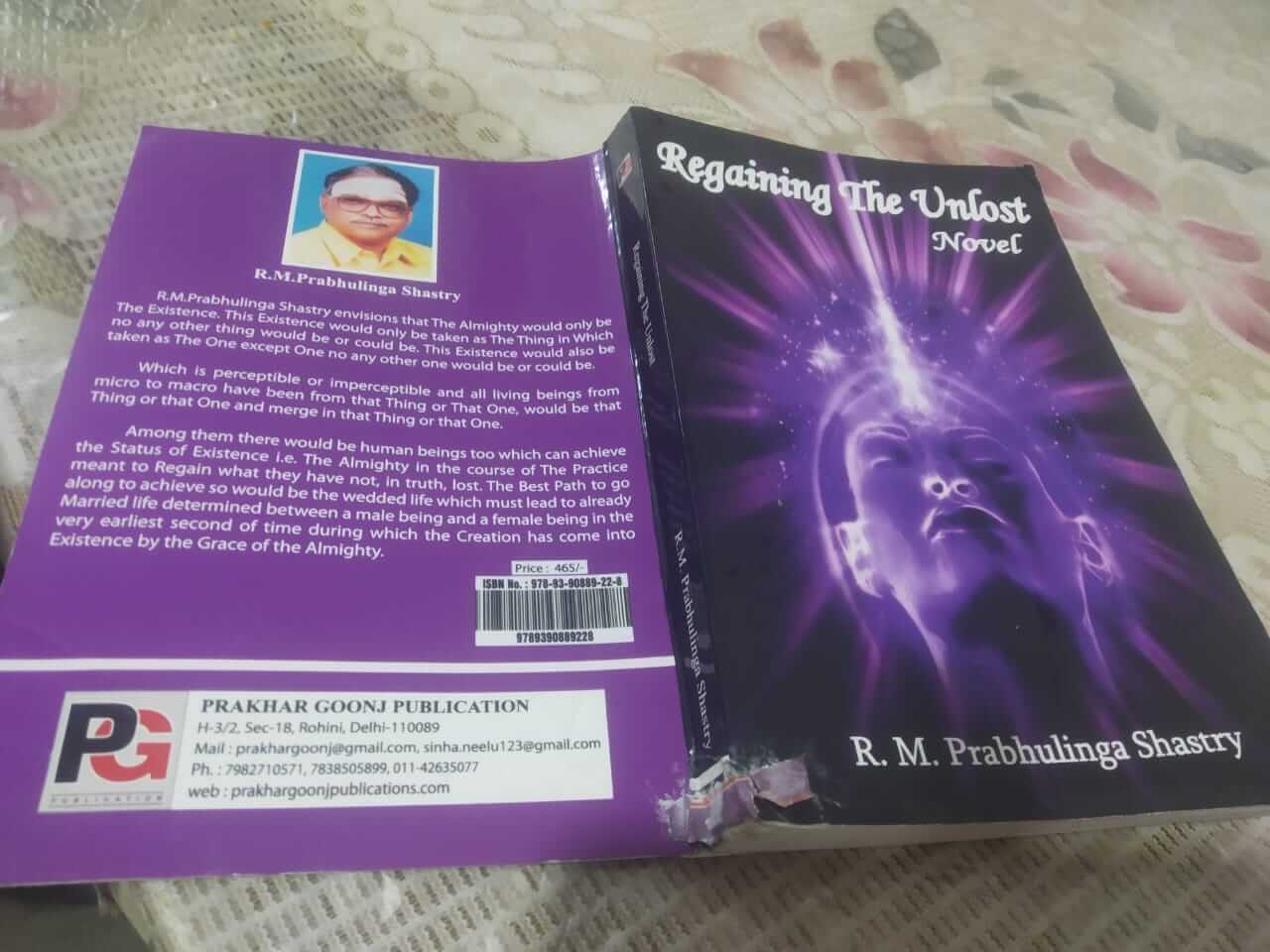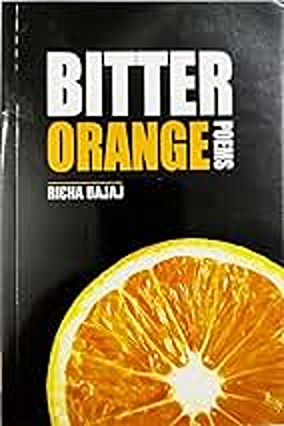Gargi reviews “Regaining the Unlost” by RM Prabhulinga Shastry, which explores Indian Advitic spiritualism, addressing existence, illusion, liberation, genders, societal norms and higher thought, exclusively for Different Truths.

Regaining the Unlost” by RM Prabhulinga Shastry is a metaphysical book that discusses philosophical concepts in detail. The entire novel is based on Indian Advitic spiritualism, which deals with the Almighty, the Atman, the Creation and the Beings. The Indian Sanatanas envisioned and preached this spirituality in various scriptures. They founded the institution that imposes all necessary rules and regulations on every human being who is honoured as a ritualistic being. This institution aims to preserve the entire creation for beings to be emancipated, meaning to regain the unlost state and be the Almighty once again. According to this belief, each, and everything, and each on would come into existence according to the will of oneself only, appearing as a thing and one.
While debating is done, there are some poems composed that strengthen the content of the items of dialogue. The Indian Advitic Spiritualism endorses authoritatively each word, line, poem, and content of items written in this novel. The characteristics of this book are: There are only two characters. They keep asking questions. And solutions are also there. There are no locations or scenes in the entire novel. Dialogue drives the entire book. The characters have no names. The subject of the novel is, according to Indian Advitic spiritualism is the end of marriage.
The Sanatanas, the First and Foremost Indians, have envisioned the absolute Truth that there would be only one in existence from beginninglessness to endlessness. From this one, energy and matter (as the five fundamental elements, i.e., sky, air, fire, water, and earth) would come into existence. Along with them, one would come into creation as one, one, and one. Thus, innumerable ones would come.
Nature and bodies would be made of matter. Each one would cherish the illusion that one would not be omnipresent, omniscient, and omnipotent like the one from whom they would come into creation. Owing to this cherishing, each would assume that one has lost what is lost; one would not know. Thus, one would be born either male or female, according to one’s deservedness. Also, each female being would differ from another female being and each male being would differ from another male being.
The body of any being consists of three types of bodies. They are: (1) microbody, (2) microbody; and (3) casual body. The causal body would be the same for all the beings, but deeds would be recorded separately for all. The microbody, and microbodyould be separate for every being.

To be emancipated from this mundane world, every female being would have to reach its male being. For this to happen, the female being would have to practice attentively and devotedly. For the female being to reach the male being, he would have to keep himself sacred. Human beings must select a female being or a male being, and to select this match, there are certain customs, and traditions established by society.
While abiding by the rules and regulations imposed by society, the customs, the traditions, etc, the female being, d the male being would have to attend physical intercourse and also attain spiritual intercourse to be liberated from the mundane world. Emancipating from the mundane world means regaining what they have lost.
In the first chapter, the speaker argues that we ought to be rationalistic. In the second chapter, the speaker defines rationalism as the practice of treating reason as the ultimate authority. The third chapter discusses will and chapter four throws light on illusion. Cherishing the illusion means immersing yourself in it.
In chapter six, the author discusses the relevance of ‘I’ He says,’’ So worshipping the ‘I’ would mean worshipping every ‘I’ and worshipping each ‘I’ to each ‘I’ would mean to worship the ‘I’ only?
He further suggests that education is the manifestation of perfection existing in hugs already.
In chapter seven, he asserts, ‘Do and I would be the same. The only ‘I’ would be consciousness. In chapter eight, he further discusses, ‘Like:the only ‘I’ would cause for the doings of each ‘I’, the male being would cause for the doings of the female being to retain its femineity. Because of their rewards or retributions, the beings would receive their repeated lives.’
Chapter ten substantiates a sense of pleasure. Chapters eleven and twelve throw light on the Casual body. It would be neither a bit of every ‘I’ nor any sort of matter to which both the only ‘I’ would be during the many goes on. ‘As the causal body, the only ‘I’ would be the spectator for everything done, and every ‘I’ would be of each aftermath of that doing and the consequences of every aftermath too.
Chapter fourteen affirms that every action contains the Mind, the Speech, and the deed. Chapter seventeen suggests that homo sapiens behave while applying minds, whereas all other beings do without applying their minds. It also adds that all other beings except humans have their minds, but they don’t have the intellect to apply the minds.
Chapter eighteen explains kinship and relationships and warns against making love in front of others. By doing so, they would fall into beastliness, which is the state of voluptuous beings.
Chapter twenty-nine discusses sexual intercourse at length. In chapter thirty-three, the author advises homo sapiens to know their lineage. Later, I learned that it must not be assumed, even in dreams, to have illicit affairs with any homo sapiens from its lineage and behave with all from its lineage as its children or parents. The parent is expected to not only beget progeny but also get progeny to flourish physically, mentally, and spiritually. The child is expected not only to perpetuate its lineage but also to perpetuate the spiritual values established by its parents, grandparents, and even great-grandparents.
Chapter forty highlights morality and aesthetics in detail. Chapter forty-one focuses on art and Chapter forty-two deals with literature. Chapters forty-three and forty-four enumerate music and congeniality.
While debating alone, there are some poems composed that strengthen the content of the items of dialogue.
In the concluding chapter, fifty-eight, the author becomes very philosophical in his analysis, ‘Nothing would have been. Nothing would last as nothingas long as long asNothing would contain nothing and no one… Sky, space and place would have been nothing in nothing. Top and bottom would have been nothing in nothing. So, zero would have been present. Zero would have been going on…’
All the Envisioners of spiritualism must agree and accept the subject. The English grammarians might not agree on the usage of very few words like ‘Player I’, and ‘Believer I’. It could be proven that English language would adopt the very strange idea of Sanatanas envisioned in the Sanskrit language perfectly, without any confusion or opacity.
Reading this book, readers will be transported to a higher level of distinguished thoughts, feelings, and aspirations away from the carnal, mundane, materialistic life. I congratulate and I wish the author all success in future endeavours. I hope his philosophy and metaphysical bent of mind can transform humanity for a better, happier, more serene tomorrow, and the egoist, monstrous ‘I’ dissolve in a boundless pool of quietude.
Cover photo sourced by the reviewer.





 By
By
 By
By
 By
By
 By
By
Brilliant review of the book